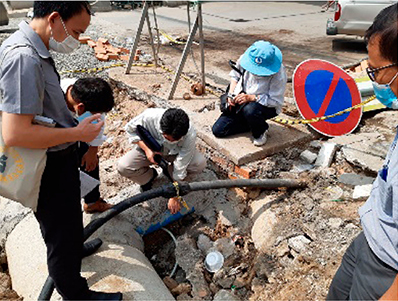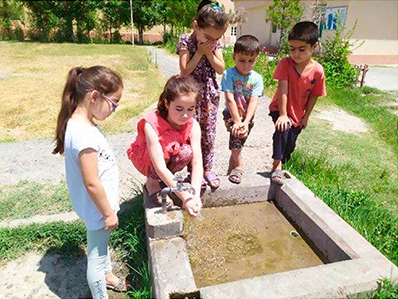(2) Water and Sanitation

A JICA expert working with Cambodian counterparts at a sewage pipe construction site to improve the sewage management capacity of Phnom Penh to treat its increased volumes of sewage due to rapid urbanization and population growth (Photo: JICA)
Water and sanitation are vital issues linked to human life. Throughout the world, approximately 2 billion people do not receive a supply of safely-managed drinking water, and 3.6 billion people cannot use safely-managed sanitary facilities such as toilets. Note 60 In developing countries where piped water is not widely available, women and children are often compelled to spend hours fetching water, being deprived of opportunities for participation in society and for education. An unstable supply of water has a negative impact on healthcare and agriculture. SDG 6 sets forth the objective to “Ensure availability and sustainable management of water and sanitation for all.”
● Japan’s Efforts

Children washing their hands at a water supply facility constructed at an elementary school in Tajikistan (see also “Project Introduction Column”)
Japan has the best track record in the world for cumulative total assistance since the 1990s in the fields of water and sanitation. In 2022, Japan provided assistance for the development and expansion of water supply and sewerage systems in Cambodia, Indonesia, Laos, and Viet Nam. In Cambodia, for instance, Japan supports Phnom Penh Capital Administration and the Ministry of Public Works and Transport in their efforts to build a sewerage management system through the development of legal and institutional systems concerning sewerage management. As for Tajikistan, Japan implements a technical cooperation project to strengthen the water service management capacities of Pyanj and Khamadoni Vodokanals in order to improve water supply services (see “Project Introduction Column” for details).
At the 4th Asia-Pacific Water Summit, which was held in Kumamoto City, Japan in April 2022, Prime Minister Kishida announced the “Kumamoto Initiative for Water,” Japan’s measures to contribute toward resolving water issues. The Summit was attended by leaders and ministers from approximately 30 countries in the Asia-Pacific region (see “ODA Topics”).
Japan also makes efforts to improve water environments in developing countries around the world in cooperation with Japanese and local private companies and organizations. For example, in Indonesia, the “Verification Survey with the Private Sector for Disseminating Japanese Technologies for Automatic Regenerating Activated Carbon Wastewater Purification Systems with a View to Promoting the Use of Regenerated Water and Industrial Wastewater Treatment” was implemented utilizing JICA’s SDGs Business Supporting Surveys. There was a need to solve environmental issues such as river pollution caused by insufficient treatment of dye effluent and ground subsidence following excessive ground water intake, as the textile industry thrives in the country. Through this project, so far, two large-scale purification systems have been installed, which made it possible for factory wastewater to be treated and reused. They contribute to the effective use of water as a resource, the rationalization of water usage, and the reduction of the amount of wastewater, thereby reducing the environmental impact on nearby rivers (see “Project Introduction Column” for support to Uganda through Japan Platform (JPF)).
In order to address the lack of local information and knowledge with regard to the problem of serious water contamination in many Asian countries, the Ministry of the Environment (MOE) of Japan implements the Water Environment Partnership in Asia (WEPA). Through cooperation among 13 participating countries Note 61 from Asia, WEPA aims to enhance water environment governance in Asia through building human networks, gathering and sharing information, and strengthening capacity. In April 2022, the 17th WEPA Annual Meeting was held in a hybrid format, both online and in-person. It focused on the “Current Status and Challenges of Domestic Wastewater Governance” and “Current Status and Issues of Introduction of Decentralized Wastewater Treatment Systems.” The participants shared information on progress made on water environment governance in each country and lively exchanged views. Moreover, to contribute to achieving “halving the proportion of untreated wastewater” set in Target 6.3 of the SDGs, MOE introduces Japan’s advanced decentralized wastewater treatment facility “Johkasou” technology, legislative systems, etc., mainly for Asian regions. The 10th workshop was held online in November 2022 with a focus on grey water treatment, which is one of the major issues in decentralized wastewater treatment. During the workshops, presentations were made about the importance and benefits of properly treating grey water, measures related to legal systems for expanding the spread of treatment facilities, and examples of efforts by local public entities, followed by active discussions on these topics. This helped the participants gain a common understanding of the future direction and improvement measures to resolve the issues. Through the workshop, information on decentralized wastewater treatment systems, including the “Johkasou” facility, was disseminated, and cooperation with people involved in decentralized wastewater treatment in each country was strengthened.
- Note 60: According to the data of UNICEF (2020).
https://data.unicef.org/resources/progress-on-household-drinking-water-sanitation-and-hygiene-2000-2020/ - Note 61: The 13 countries are Cambodia, China, Indonesia, Republic of Korea, Laos, Malaysia, Myanmar, Nepal, the Philippines, Sri Lanka, Thailand, Viet Nam, and Japan.
